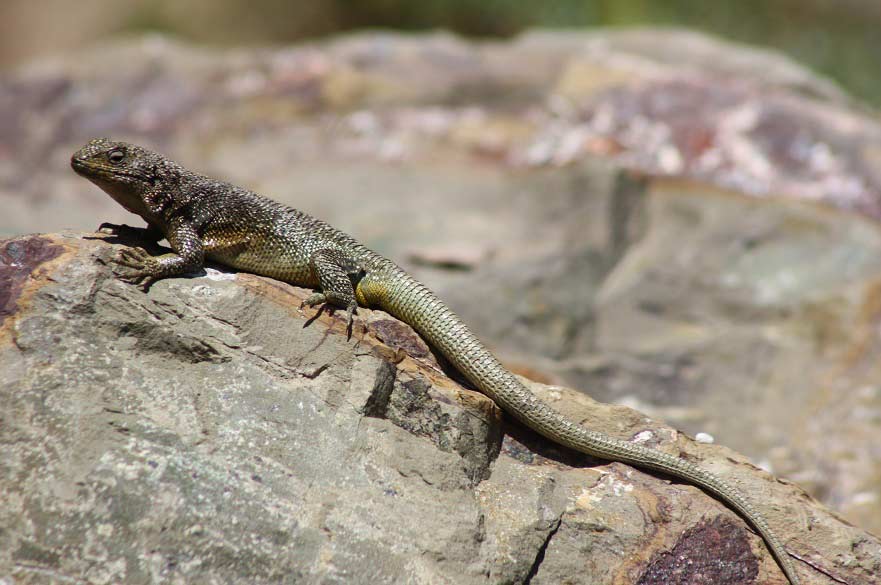Lizards from cold climates may face rapid extinctions in next 60 years, study shows
Lizards that produce live young are significantly more likely to be driven to extinction through climate change than those that lay eggs, new research suggests.
By Dave Rogers | Published on 15 May 2019
Categories: Press office; Research; School of Science and Technology;

The study, involving Nottingham Trent University and the University of Lincoln, suggests that live-bearing lizards face high risks of extinction within the next 60 years, driven predominantly by rising temperatures.
Researchers investigated how strategies for reproduction that live-bearing (viviparous) or egg-laying (oviparous) modern lizards evolved in the past can affect their chance to survive ongoing climate change caused by humans.
As part of the work, the team argue they have confirmed the emerging ‘cul-de-sac’ theory, which suggests that live-bearing reproduction evolved in lizards that colonised cold climates, such as high elevations and latitudes.
This adaptation, however, is dragging them to extinction.
The theory – developed by NTU’s Dr Daniel Pincheira-Donoso – suggests that following colonisation of those harsh environments, mothers ‘retained’ the eggs in their bodies to act as incubators, and this provided embryos with stable conditions of temperature and oxygen.
It is thought that, over time, this egg retention evolved into birthing live young.
Reproducing live young is not very effective in hot environments, however, and once reptiles evolve in this way, they remain ‘trapped’ in cold areas.
As climate warming rapidly progresses towards higher elevations and latitudes, the ‘suitable’ cold climates where live birthing species live will be pushed towards mountain tops and continent edges until lizards run out of space and are eventually wiped out.
The study looked at three groups of highly-diverse lizards from South America: one which only has viviparous species, one with only oviparous species, and one which has evolved both forms of reproduction.
To investigate whether ongoing climate change will cause extinctions predicted by the theory, the researchers used computational modelling of current climate change, combined with real data on the conditions that lizards live under.
Their team, led by Dr Pincheira-Donoso, found that live-bearing species will displace towards the mountain tops at significantly faster speeds than egg-laying species – displacing at a rate of 0.3% of the current geographical range per year.
While this means that viviparous lizards will face high extinction risks within just six decades, oviparous species will remain largely unaffected. Of all the climatic factors studied, temperature was the dominant factor responsible for these extinctions.
“Human-induced climate change has forced the modern world to face one of the most severe periods of global-scale extinctions of species since life began,” said researcher Dr Daniel Pincheira-Donoso, a bioscientist at Nottingham Trent University.
He said: “Our results highlight the extent of the extinction crisis that modern biodiversity is currently facing. By 2080, more than half of the current ‘cold lands’ in the area we investigated in South America will have become warm, leading current resident species to extinction.
“Extinction risks are known to increase as a result of rapid climatic alterations and environmentally sensitive species traits that fail to adapt to those changes.
“Viviparous lizards appear to have undergone a ‘double-edged adaptation’ – life births evolved because it was the critical adaptation that reptiles needed to colonise cold climates, but it will also accelerate their extinctions.
“This work provides us with an opportunity to identify specific areas that need more urgent protection – such as high mountain elevations where extinction risks will concentrate.
“This phenomenon would apply to other reptiles, such as snakes, anywhere in the world.”
Researcher Manuel Jara, who was at the University of Lincoln when the work was carried out, added: “Live-bearing lizards are predicted to follow their dramatically shrinking cool habitats, increasing their risk of extinction.”
The study, published in the journal Scientific Reports, also involved North Carolina State University and Virginia Tech in the United States, the University of Valencia in Spain and the Pontificia Universidad Católica del Ecuador.
Notes for Editors
Press enquiries please contact Dave Rogers, Public Relations Manager, on telephone +44 (0)115 848 8782, or via email.
Nottingham Trent University (NTU) was named University of the Year 2019 in the Guardian University Awards. The award was based on performance and improvement in the Guardian University Guide, retention of students from low-participation areas and attainment of BME students. NTU was also the Times Higher Education University of the Year 2017, and The Times and Sunday Times Modern University of the Year 2018. These awards recognise NTU for its high levels of student satisfaction, its quality of teaching, its engagement with employers, and its overall student experience.
The university has been rated Gold in the Government’s Teaching Excellence Framework – the highest ranking available.
It is one of the largest UK universities. With nearly 32,000 students and more than 4,000 staff located across four campuses, the University contributes £900m to the UK economy every year. With an international student population of more than 3,000 from around 100 countries, the University prides itself on its global outlook
The university is passionate about creating opportunities and its extensive outreach programme is designed to enable NTU to be a vehicle for social mobility. NTU is among the UK’s top five recruiters of students from disadvantaged backgrounds. A total of 82% of its graduates go on to graduate entry employment or graduate entry education or training within six months of leaving. Student satisfaction is high: NTU achieved an 88% satisfaction score in the 2018 National Student Survey.
NTU is also one of the UK’s most environmentally friendly universities, containing some of the sector’s most inspiring and efficient award-winning buildings.
NTU is home to world-class research, and won The Queen’s Anniversary Prize in 2015 – the highest national honour for a UK university. It recognised the University’s pioneering projects to improve weapons and explosives detection in luggage; enable safer production of powdered infant formula; and combat food fraud.